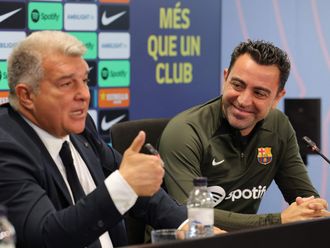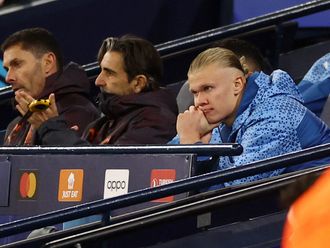Los Angeles: Germany were three minutes from winning their first World Cup in a generation and Bastian Schweinsteiger couldn’t see.
“I had tears in my eyes,” the German captain said as he recalled the closing seconds of his team’s 1-0 win over Argentina four years ago in Brazil. “I couldn’t believe I was so close. It was kind of a feeling of, ‘Finally you will have it.’”
Willy Sagnol has different memories of his only World Cup final.
“I was quite angry for some weeks,” he says of France’s penalty-kick loss to Italy in 2006.
“The World Cup final. The dream of a football player’s life,” he continues. “And I was so close to having it.”
The disappointment, he concedes, remains “somewhere deep inside me.”
Though their World Cup adventures ended differently, the experiences of Schweinsteiger and Sagnol have earned both men membership in an elite club. Fewer than 400 people still alive know what it feels like to play in a World Cup final, a number that will swell slightly following this summer’s tournament in Russia.
But unless you’ve been there, there’s no way to understand the high that comes from winning a final ... or the disappointment and despair that comes with losing.
“From the first day to the last day of the World Cup, you live in a kind of a bubble,” Sagnol said. “You know you are playing in a World Cup. You know you are playing against Brazil or Italy or whoever. But you don’t really feel that pressure.
“You know it’s something important but you don’t think about it. Maybe it’s better not to think about it.”
Sagnol was on the World Cup team in 2002 but didn’t play as France were bounced, winless, in three games. Four years later, in Germany, however, he was a key performer, starting all seven games at right back for a team who conceded just two goals and reached the final unbeaten.
France’s final opponent, Italy, had been more stingy, allowing just one goal in group play — in a 1-1 draw with the US — before shutting out all three opponents in the knockout rounds. The final, it appeared, would be decided by which team made the more costly mistake, and that proved to be France — or more precisely French captain Zinedine Zidane. He was sent off with 10 minutes left in extra time of a 1-1 game for headbutting Italy’s Marco Materazzi.
“He left us alone on the pitch at the worst time. The World Cup final. The dream of every football player’s life,” Sagnol says.
Reduced to 10 men, France managed to send the game to penalty kicks. Sagnol was shooting fourth — a miss would have handed Italy the title — but he scored. That only delayed the evitable, though, with Fabio Grosso scoring the clincher on the next shot.
“It’s just very brutal the way it stops because it stops in one second,” Sagnol says. “I can’t even remember who shot the last penalty. And then it’s over. It’s difficult to accept. You would like someone to come and say: ‘No, it’s OK. You still have 10 minutes to play. Maybe you can come back.’ It’s very weird.
“You don’t know how to react. Cry. Shout. You don’t know if you want to be alone or it you want to be with the other players. You’re in between every kind of feeling.”
Schweinsteiger’s Germany rolled into its final four years ago in more impressive fashion, routing host Brazil 7-1 in the most one-sided semifinal in tournament history. Next came Lionel Messi and unbeaten Argentina, whose flair and creativity stood in stark contrast to Germany’s implacable dominance.
Argentina were the better team in the first half, with Gonzalo Higuain mis-hitting a shot at the end of a breakaway and then finding the back of the net eight minutes later, only to have the goal disallowed by an offside call. Given the reprieve, Germany slowly began to wrest control.
“I played professional football since 2002 and I only played once in a World Cup final,” Schweinsteiger, 33, now retired from international football and playing in MLS for the Chicago Fire, said.












